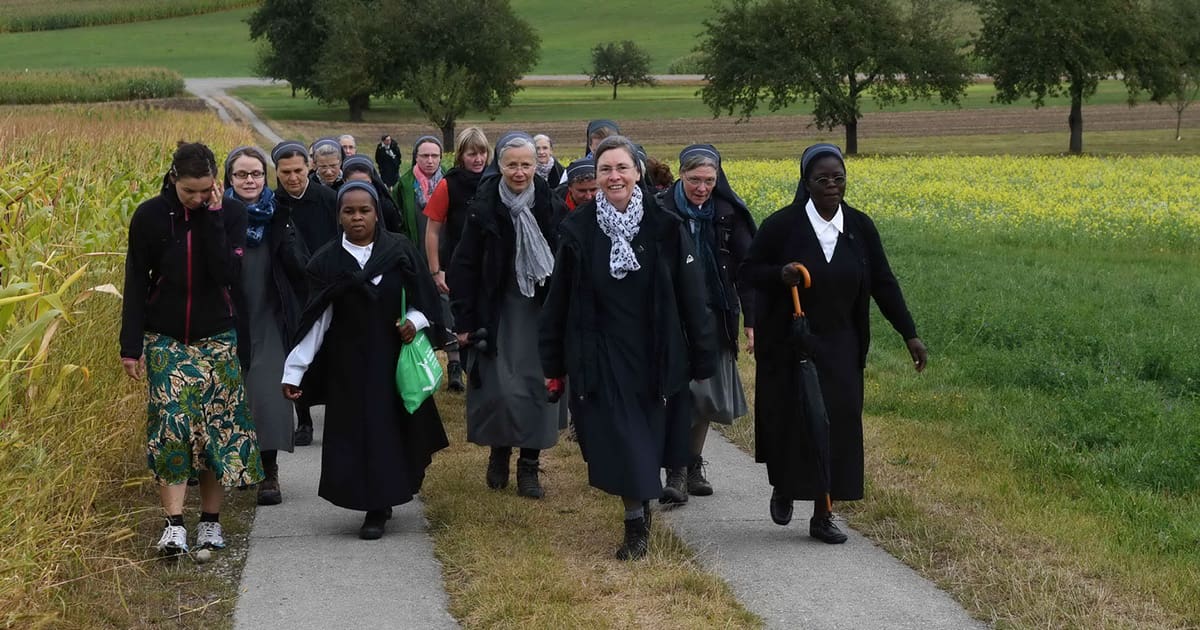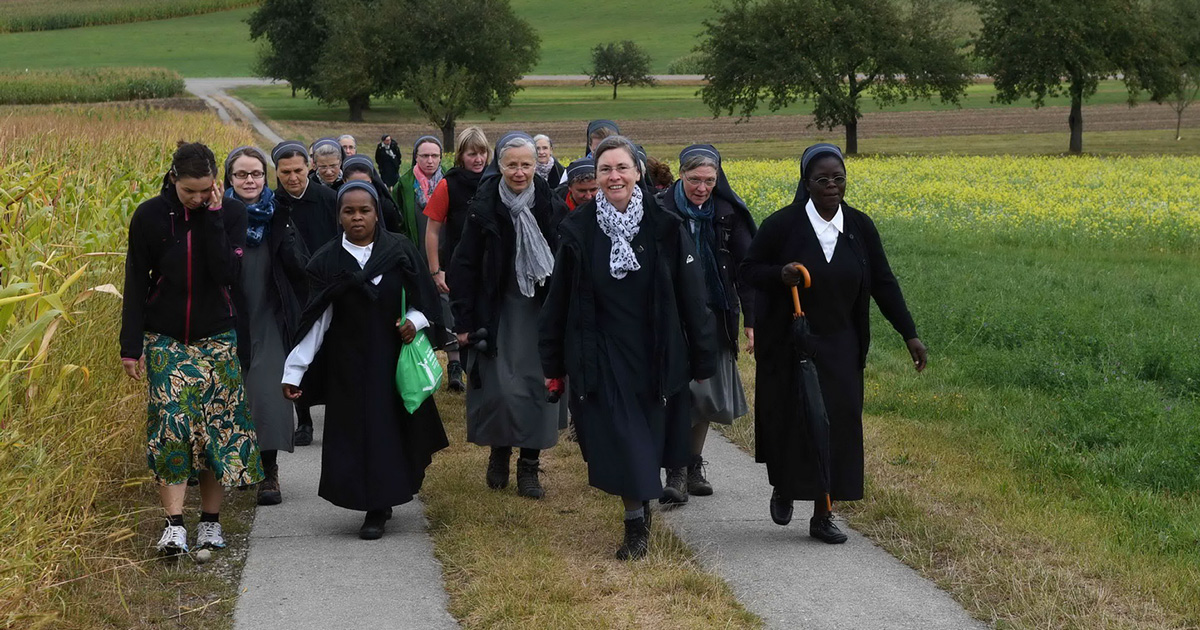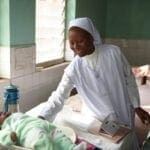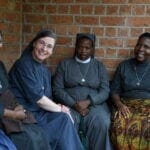Interview with Sr. Elisabeth Halbmann, General Superior of the Sisters of Mercy of St. Vincent de Paul in Untermarchtal (Germany)
Can you explain the charism of your Congregation and the link with St. Vincent de Paul and Saint Louise de Marillac?
Our name already expresses the connection to our charism: As Sisters we call ourselves “Sisters of Mercy of St. Vincent de Paul in Untermarchtal.” We are women who live the Gospel of Jesus Christ according to the example of St. Vincent de Paul and St. Louise de Marillac. St Vincent and St Louise saw in the events of their every day life and in the people whom they encountered, a call from God. Their response was a response of love.
According to the words of St. Vincent de Paul, “This is your mission: To be instruments of God’s goodness to the poor and sick and to communicate God’s peace to them.” In 1852 the first Sisters of Mercy from the Motherhouse in Strasbourg (Alsace/France) began their ministry among the sick in the hospitals which , at that time, were in very bad condition.
With a boundless trust in God and an unshakeable faith in God’s guidance, they began to serve children and young people, the sick and the elderly … all people who were abandoned and/or marginalized. In accord with the words from the Gospel of Matthew 25:40, ” Whatever you did to one of the least of these brothers and sisters of mine, you did to me,” we still try to live the physical and spiritual works of mercy and to proclaim the good news of the Gospel in word and deed.
Sister Elizabeth, what is the mission of your Congregation? What are your fields action?
In order to respond effectively to the various faces of poverty, the Sisters , over the course of many years, established social and charitable works and educational institutions. They attempted to meet people’s needs through affective and effective service. Together with about 6,000 employees, we work in large and small institutions: hospitals, psychiatric institutions, homes for the elderly, rehabilitation centers, child and youth care centers, schools for the deaf, training centers for social professionals.
The Sisters also minister in pastoral care in parishes, in prisons, in health clinics, in institutions for the elderly, with the homeless and prostitutes, and they care for migrant and refugees.
The Educational Forum Untermarchtal (Centre for Retreats) is a place where the Sisters and guests of all ages meet for spiritual retreats, spiritual days of recollection and, on-going formation.
In 1960, four sisters were Sent to Tanzania to proclaim the Gospel to the people in word and deed. Today, 245 Tanzanian Sisters are active in ministry among the poor: in dispensaries, kindergartens, homes for children, centers for the deaf, centers for the disabled, hospitals, pastoral care centers where the Sister promote and support women.
In Ethiopia, the community of Sisters there has been growing since 2006 and at the present time there are currently 14 Sisters from that country who are serving the poor.
In 2020, we sent two German and two Tanzanian sisters to Kenya to help build a facility for children and young people with multiple disabilities. Unfortunately, this project had to be interrupted due to the Corona pandemic.
Last January you participated in the meeting held in Rome: after almost a year what are your considerations on that meeting? What are the challenges of charity?
For me it was very impressive and valuable to learn more about and experience the worldwide Vincentian Family. The Vincentian Family became more concrete for me and I am now able to put a name on some of the many new faces that I encountered there. This is how networking becomes possible. Experiencing the diversity of members, knowing, however that we share a common spirituality gives me strength, broadens my perspective and inspires me. The advantages and use of technology for virtual communication have become more self-evident and have provided us with a closeness during this time of the pandemic.
I see above all 3 challenges to charity work:
– The religious longing of many people is most apparent especially in because so many do know some of the essential of their faith. Often, the inability of the Church to put in place some of the needed reforms leads to disappointment among people.
– The COVID-19 pandemic has highlighted the urgency of systemic change: this has become evident in issues such increased poverty among the elderly, wage inequality, the refugee crisis and the need to create affordable housing for families.
– Because of the pandemic, psychological, mental and addictive disorders are on the rise in our country.
Charity in our day has been upset by the arrival of COVID-19: how did you respond as a religious congregation to the pandemic?
Our Sisters, staff and co-workers were very challenged in their service on behalf of elderly and sick people: in the nursing home, in the hospice, on the Covid intensive care unit in the hospital. Many staff have been infected and have fallen ill themselves.
Sisters were challenged with ethical issues (e.g. triage of patients), accompanying families and relatives who were themselves in quarantine and not allowed to accompany their sick and dying relatives. Some Sisters helped in nursing homes of other communities of Sisters where the staff were all ill. Some of our Sisters were also infected.
We tried to support the staff by processing their experiences and offering them opportunities for dialogue.
During the lockdown, the Sisters secured emergency care for the children in kindergarten and in some of their schools.
As violence in families increased significantly and women’s shelters became overcrowded, we provided emergency shelter for women in precarious situations.
As soup kitchens were closed, we supported the distribution of cold meals with bread, sausage and eggs (so-called brown bag lunch).
We have set up an emergency telephone service for people who feel the need to simply talk to a Sister about their situation, worries and/or fears.
We have installed an online service where people can write to us with their concerns, and we bring this worries and concerns into our prayers … this has actually become a very well received service.
Since we can no long teach in the classroom with our students physically present, we now offer events online and through video and live streaming: e.g. spiritual guidance, retreats, spiritual reflections, Bible talks, retreats for everyday life, Mass.
Last but not least, we Sisters pray for the intentions and needs of those persons who find themselves in a difficult situation: we pray for the sick, the dying, the many first responders. May we all learn from this crisis situation, and may God help us to create situations of greater justice, peace, reconciliation, love and preservation of creation.
For our Sisters in Tanzania, the situation with Covid-19 is very different and brings other challenges. Officially, the pandemic does not exist there. People are not allowed to talk about it and prevention measures are forbidden. That makes us very worried.
Could you share with us a significant moment in your journey as Superior General of the Congregation?
A significant and deeply touching moment on the way as Superior General of my community was the experience at a meeting of the capitulars in September 2017:
After talks and discussions, all the capitulars unanimously agreed that we, as a German community, want to consciously move forward as an international community. We said yes to our Tanzanian and Ethiopian Sisters. We did not and do not now want to separate ourselves from our African Sisters, who now, are equal in number to us. We want to continue our journey as Sisters of Mercy of St. Vincent de Paul, supporting, enriching and endowing each other in our diversity as we minister on behalf of the poor, the disadvantaged and the marginalized.
This means that we are in the process of changing our Constitutions and taking on a new ecclesiastical structure, namely, an international Generalate, a German and a Tanzanian Province and an Ethiopian Region.
One month later, the first worldwide meeting of the Vincentian Family took place in Rome and I invited some of our younger Sisters to participate.
I am very grateful to be included in this large worldwide network. It encourages me, gives me hope and joy, gives a sense of purpose and awakens creativity, despite all the difficulties and obstacles. I feel that God’s Spirit is at work in this worldwide family.
Sr. Elisabeth Halbmann, General Superior, Untermarchtal, Germany
Tags: Germany





















0 Comments